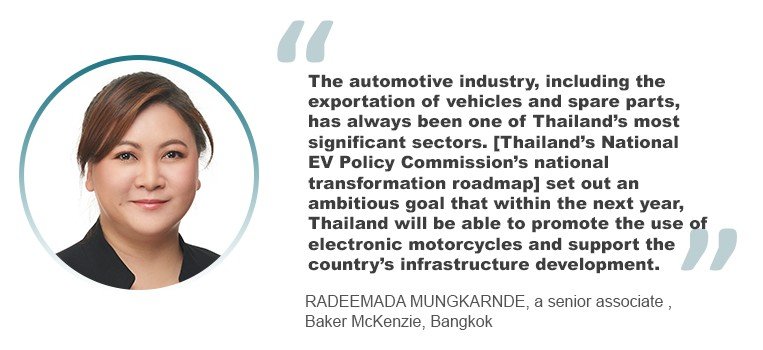The pandemic predictably had an influence on the automobile sector, particularly on the research and development for electric and autonomous vehicles (E/AV). In the midst of Covid-19, companies let go of workers, delayed testing and postponed product releases.
Still, despite the pandemic’s negative effects and the ambiguity surrounding artificial intelligence patents, E/AV makers continued to innovate at breakneck speed and exploit their patent portfolios to acquire considerable investment. For instance, some companies used their technology to tackle the pandemic’s particular issues. They used EVs to carry medical supplies, food, and deliveries. Others used EVs to disinfect regions and established alliances to speed up the development of EV technology to stop the infection from spreading. Some businesses have also repurposed their technology to help with other causes, such as charitable delivery.
In addition, some companies launched robotaxi services to give individuals an alternate mode of transportation, and these were altered to collect temperature readings and disinfection procedures.
According to Ian Lindsay, a partner at law firm Allens in Melbourne, EVs have benefitted companies and individuals over the years, even during this pandemic. With intellectual property (IP) filings relating to electric vehicles consistently increasing for more than a decade, the uptake of EVs, in and of themselves, are not necessarily disruptive to IP in general. Instead, he says, the peripheral technology and services that flow from EVs are the likely forms of disruption.
“For example, EVs are predicted to play an important part in balancing our power grids in the future, and the overlap between consumers and infrastructure providers, and raises unique IP issues that will need to be resolved,” he says. “Furthermore, the displacement of supply chains surrounding combustion engines will likely create new IP opportunities. With this in mind, a significant focus for EV innovation has been directed towards battery development, particularly in cell chemistry and fast charging advancements. However, as with other industries, blockchain and AI technologies are providing new avenues of development that will likely have flow-on effects and pose new IP developments.”
EVs have been well-recognized by both the public and private sectors in most parts of the world, including Thailand. Not only are they notable for being environmentally friendly, sustainable, cost-effective and fuel-efficient, but the EV trend is on the rise globally, and has opened up many promising business opportunities in Thailand.
“The automotive industry, including the exportation of vehicles and spare parts, has always been one of the nation’s most significant sectors,” says Radeemada Mungkarnde, a senior associate at law firm Baker McKenzie in Bangkok.

“According to the Thailand Board of Investment, the industry contributed approximately 12% of the GDP, employed approximately 850,000 workers and was one of the largest automotive manufacturers in Southeast Asia, which confirmed Thailand as the automobile hub of Asia. With the significance of the industry, along with the country’s existing environmental protection policy, the government has rolled out a plan to promote the production of EVs to maintain its current position and expand its role to claim the title as the manufacturing hub for EVs in Asia.”
She adds that, recently, Thailand’s National EV Policy Commission announced its national transformation roadmap, consisting of a three-phase development plan.
“The roadmap set out an ambitious goal that within the next year, Thailand will be able to promote the use of electronic motorcycles and support the country’s infrastructure development,” she says. “Within two to four years, the EV industry will be able to manufacture more than 225,000 cars and pickup trucks, 360,000 motorcycles and 18,000 buses/trucks, including batteries, and within five to nine years; 30% of the total vehicle manufacturing will be EVs in accordance with the 30/30 Policy. To support the transition, the Board of Investment has also rolled out a plan to attract foreign investors and promote domestic EV production by implementing financial and tax incentives (such as an 8-year tax holiday and import duty exemptions), developing and offering EV privileges to automobile companies to make domestic production more attractive, establishing appropriate infrastructures, safety standards and developing regulations to support the EV industry.”
Electromobility has a major role to play in combating climate change, says Pimpisa Ardborirak, an associate at Baker McKenzie in Bangkok.
According to the International Renewable Energy Agency (IRENA), 350 million EVs will be needed by 2030, pushing innovations in this industry and influencing share values as manufacturers, suppliers and investors move to capitalize on the energy transition.
“As of 2021, around 8 million EVs account for approximately 1% of all vehicles on the world’s roads, with 3.1. million sold last year, representing a 4% market share,” she says. “There are still environmental controversies surrounding EVs as the reduction of emissions from fuel vehicles may be followed by an increase in emissions from the power sector. The true impact of EVs is dependent on the energy sources used, renewable vs. nonrenewable. Additional low carbon electricity generation from renewables will need to be combined with the model shift towards EVs to ensure emissions are reduced. EVs are also a more accessible vehicle than hydrogen fuel cell electric vehicles in terms of different types of cars and charging points. They include more efficient processes compared and, if their lithium batteries are re-used to meet different ends, in which IP exhaustion of rights plays a key part, they’re likely to stay a more sustainable solution, at least over the next few years.”
Excel V. Dyquiangco


-x-large.jpg)
